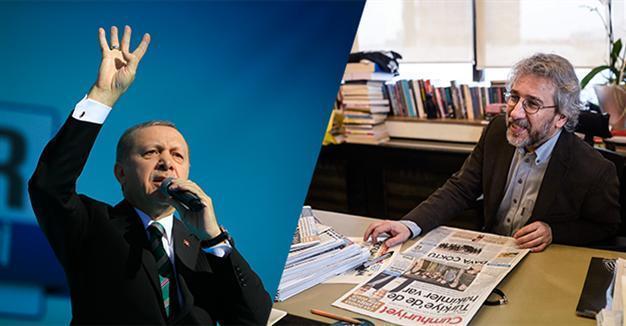Top court ruling on journalists was against the nation: President
ANKARA

Turkish President Recep Tayyip Erdoğan (L), AA Photo. Editor-in-Chief of daily Cumhuriyet, Can Dündar (R), AFP Photo.
President Recep Tayyip Erdoğan has heightened the tone of his criticism against the country’s Constitutional Court by saying the top court’s verdict which caused the release of two journalists from prison was “against the nation.”
“The Constitutional Court has to be one of the institutions that should be the most sensitive about the interests and rights of the state and the people. But this institution and its president [Zühtü Arslan] have not hesitated to rule against the country and its people on one of the most concrete examples of a massive attack towards Turkey in recent times,” Erdoğan said at a rally in Burdur, a Western town, on March 11.
Two prominent journalists from daily Cumhuriyet, its editor-in-chief, Can Dündar, and Ankara bureau chief, Erdem Gül, were set free after 92 days of imprisonment as a result of a Constitutional Court decision which said their rights had been violated. Dündar and Gül had been arrested by a lower Istanbul court on charges of espionage and terrorism after they reported about claims that Turkey’s National Intelligence Organization (MİT) was allegedly shipping weapons to rebels in Syria.
Erdoğan vowed he would continue to stand against the top court’s verdict in line with his presidential duty to protect the constitution, saying, “I am responsible for monitoring the orderly and harmonious work of state bodies, the implementation of the constitution and representing the unity of the state and the people of the Republic of Turkey. Those who would exceed the boundaries of its authority will have to face me. I will never hesitate to voice my objections in the name of my people if the Constitutional Court opts for such a thing.”
“It was himself, Mr. President [Arslan], who had told me, ‘We never issue a ruling before its reasoning is ready.’ But unfortunately, I was so unhappy and resentful after this. Why? Because, his position requires honesty,” he said.
‘Lower court had to resist’
The lower court in Istanbul that obeyed the top court’s ruling and released Dündar and Gül has also taken its share of Erdoğan’s criticism. “The lower court had to resist the Constitutional Court,” Erdoğan said, although the top court’s decisions are binding for all judicial institutions. “We would see what the Constitutional Court would do then. If the court insists on its decision, I believe things would develop in a different direction.”
Recalling that the lower court arrested the two journalists on charges of espionage, Erdoğan reiterated his stance that the case had nothing to do with the freedom of the press.
Alone this issue shows the need for a new constitution that would endorse the presidential system, Erdoğan stated, lashing out at oppositional parties for stopping the process.
